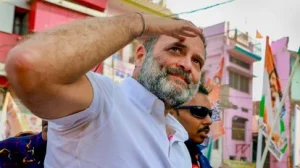A court in Maharashtra’s Nashik city granted bail to Leader of Opposition in the Lok Sabha, Rahul Gandhi, on Thursday in a defamation case related to remarks he made about Hindutva ideologue Vinayak Damodar Savarkar during the Bharat Jodo Yatra in 2022. Gandhi appeared before Additional Chief Judicial Magistrate R C Narwadia through video link and pleaded ‘not guilty’ to the charges levelled against him.
The Rahul Gandhi bail decision comes as a significant legal relief for the Congress leader, who has been facing multiple defamation cases across different states. This particular case stems from controversial statements made during his political campaign that allegedly damaged the reputation of the historical figure.
Also Read: Rahul Gandhi bail
 Rahul Gandhi allegedly made derogatory remarks about Vinayak Damodar Savarkar during a press conference in Hingoli and a speech given during the Bharat Jodo Yatra in November 2022. The case was filed by complainants who argued that Gandhi’s statements were defamatory and intended to malign Savarkar’s historical legacy.
Rahul Gandhi allegedly made derogatory remarks about Vinayak Damodar Savarkar during a press conference in Hingoli and a speech given during the Bharat Jodo Yatra in November 2022. The case was filed by complainants who argued that Gandhi’s statements were defamatory and intended to malign Savarkar’s historical legacy.
According to the complainant, Gandhi said, “Savarkar is BJP and RSS jin”, which was defamatory. Gandhi further made the allegations that “with a folded hand, Savarkar prayed for release and later on promised to work for the British government”, which formed the basis of the defamation charges.
The Rahul Gandhi bail application was crucial for the Congress leader’s ability to continue his political activities without the burden of potential arrest in this case.
The court proceedings marked an important milestone in this high-profile defamation case. Gandhi’s legal team successfully argued for bail while maintaining his innocence in the matter. The Rahul Gandhi bail hearing was conducted through video conferencing, allowing the politician to participate without being physically present in the courtroom.
The charges against Gandhi relate to statements that allegedly portrayed Savarkar in a negative light, particularly regarding his conduct during the independence struggle. The complainants argued that these remarks were made with malicious intent and caused significant damage to Savarkar’s reputation.
The granting of Rahul Gandhi’s bail has broader political implications beyond this specific legal case. As the Leader of the Opposition, Gandhi’s legal troubles have been closely watched by both supporters and critics. This bail decision allows him to continue his political activities without the immediate threat of detention.
The defamation case highlights the ongoing political debates surrounding historical figures and their interpretation in contemporary Indian politics. Gandhi’s remarks about Savarkar have been a source of controversy, with different political parties taking opposing positions on the matter.
And for more on Rahul Gandhi, kindly refer to this: Devendra Fadnavis criticises Rahul Gandhi
The Congress party has consistently supported Gandhi throughout this legal battle, arguing that his statements were part of legitimate political discourse. Party leaders have maintained that the Rahul Gandhi bail was expected, given the nature of the charges, and have criticised what they see as politically motivated legal action.
The party’s stance has been that Gandhi’s comments were based on historical records and should be viewed as part of political debate rather than defamatory statements. This position has been central to the defence strategy in securing Rahul Gandhi’s bail.
This Nashik case is not the only defamation matter involving Gandhi’s statements about Savarkar. Satyaki Savarkar, grandson of one of Vinayak Savarkar’s brothers, complained to Rahul Gandhi in April 2023. There are separate proceedings in other courts as well.
The Rahul Gandhi bail in this particular case provides relief in one of several legal challenges the Congress leader faces. Each case requires separate legal handling and has its procedural requirements.
Gandhi’s legal team has consistently maintained his innocence across all defamation cases. The successful Rahul Gandhi bail application demonstrates the strength of the defence’s arguments regarding the nature of the alleged defamatory statements.
He has claimed that Gandhi falsely accused Savarkar of writing a book in which he described beating up a Muslim person, which Savarkar never wrote and such an incident never happened. Satyaki argued that Gandhi made these false, malicious, and wild allegations with the specific objective of damaging Savarkar’s reputation, according to the complainant’s position.
While the Rahul Gandhi bail has been granted, the case will continue with regular hearings. The court will examine evidence from both sides to determine whether Gandhi’s statements constitute defamation under Indian law.
The legal process will involve a detailed examination of the context in which the statements were made, their impact on Savarkar’s reputation, and whether they fall within the bounds of legitimate political criticism or cross into defamatory territory.
The Rahul Gandhi bail case reflects broader tensions in Indian political discourse regarding historical figures and their contemporary interpretation. The case raises important questions about the limits of political speech and the balance between free expression and protection against defamation.
This legal battle occurs against the backdrop of ongoing political debates about India’s independence struggle and the role of various historical figures. The Rahul Gandhi bail decision will likely influence how such cases are handled in the future.
The granting of Rahul Gandhi’s bail by the Nashik court represents a significant legal victory for the Congress leader in his ongoing battle against defamation charges. While pleading not guilty to the charges, Gandhi can now continue his political activities without the immediate concern of arrest in this particular case.
The case continues to highlight the complex intersection of historical interpretation, political discourse, and legal boundaries in contemporary India. As the legal proceedings continue, the Rahul Gandhi bail decision provides temporary relief while the substantive issues in the defamation case await resolution through the judicial process.

